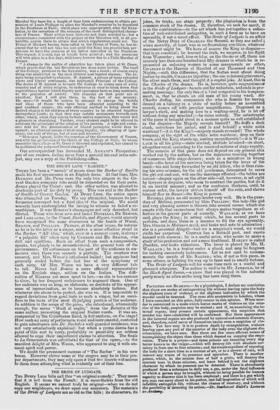THE BRIDE OF LUDGATE.
THE Drury Lane bills call this "an original comedy." They mean that it is not from the French : it is nevertheless from the old English. It seems we cannot truly be original—when we do not copy our neighbours, we*aw upon our ancestors. The materials of the Bride of Ludgate are as old as the hills; its characters, its jokes, its tricks, are stage property ; the plagiarism is from the common stock of the drama. If, therefore, we seek for merit, it is in the combination—in the art which has put together a collec- tien of well-established antiquities, in such a form as to have an agreeable, if not a novel effect. The Bride of Ludgate is an affair
of the Merry Days of CHARLES the Second, as they are called ; when morality, at least, was in no flourishing condition, whatever
merriment might be. We have of course the King in disguise— that is an essential ; he learned the trick, we suppose, in his flight from Worcester ; and, true or false, on the throne or off, there are scarcely less than one hundred and fifty dramas in which he is re- presented as seducing women in some masquerade or other. CHARLES is the Haroun al Raschid of our Thousand and One Nights,--with this difference, that the Sultan went about doing justice by stealth, CHARLES injustice ; the one redressed grievancer, the other made them; and thought it a capital joke. At least, this is the Charles of the drama. Ile is, however, quite magnanimous in the Bride of:Ludgate : he sets out for seduction, and ends in pro- moting marriage : the only fun of a kind congenial to his tempera- ment, is, that he cheats an old man of his young ward; Sir Charles Sedley, his companion (he who is famous for having danced on a balcony in a state of nudity before an assembled crowd), comes off with peculiar insignificance. Disguised as a lawyer's clerk, and making love to a waiting-maid, he is let off without doing any mischief ;—he ruins nobody. The catastrophe of the piece is brought about in a manner quite as well established as the disguise—his Majesty reveals himself! He doffs a dark cloak, unbuttons his jacket, and lo and behold! a white satin waistcoat 1.—it is the King !—majesty stands revealed! The whole company, at the sight of the white satin waistcoat, drop on their knees, and the King stands up, smiling magnificently !—it is WAD. LACK in all his glory—smile studied, attitude laboured—in short, altogether royal, according to the received notions of stage royalty. The success of this piece does not depend on any general idea worked out by the author, but on the ingenious weaving together of numerous little stage-devices ; such as a miniature in wrong hands—the lover of the mistress being taken for the lover of the maid—his suit being forwarded by an old fellow, who is thus ruin- ing his own schemes, for the old gentleman, determined to serve the girl out-and-out, will see the marriage effected—the tables are turned—despair again on the other side—all, however, is set right by lawyers in disguise, who seem to contract the parties, but do it in an invalid manner; and so the confusion thickens, until, to restore order, the lawyer strikes himself off the rolls, and shows himself Rex in Banco—the King in person. RUSSELL plays an old money-lender very well. He is the guar- dian of Melissa, personated by Miss PHILLIPS: this lady-like girl and very pleasing actress is thrown into several scenes which she enacts with that earnestness that always makes tragedians So ef- fective in the graver parts of comedy. WALLAcx, as we have said, plays the King ; in acting which, he has several parts to perform, and does them in a manner to fill the eye agreeably. Mrs. ORGER is Melissa's maid, and looks and acts to admiration : she is a perennial Abigail—had we a magician's wand, we would strilee her perpetual. COOPER has a Bobadil part, and exerts himself with success : he is a useful actor, who seems to make a study of his profession and not amere livelihood. HARLEY is called Doeskin, and looks ridiculous. The lover is played by Mr. H. WALLACE; he is a traitor under a cloud, and may be forgiven for looking excessively lachrymose. Let us not omit to comme- morate the merits of Mr. SALTER; who, if not in this piece, in some others, is fighting his way up to fame and (a small) fortune. The Bride of Ludgate will for some time rank as a useful and pleasant afterpiece. The author is said to he Mr. JERROLD, he of the Black-Eyed Susan,—a piece that was played in the suburbs pretty nearly as often as the song has been sung there.


























 Previous page
Previous page